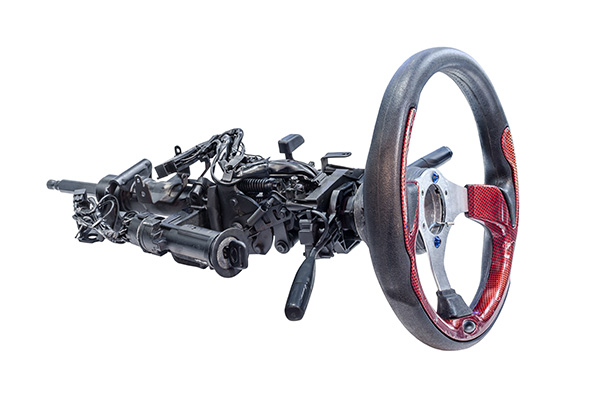
If your steering wheel starts to shake the moment you press the gas, it’s not just an uncomfortable feeling—it’s a sign that something is off in your vehicle’s drivetrain or suspension. Vibration during acceleration doesn’t happen without reason, and while the issue could be minor, it’s often something that should be checked out before it gets worse.
Let’s look at the most common causes of steering wheel vibration under acceleration and what they might mean for your vehicle.
Unbalanced or Damaged Tires
Tires are often the first place to look. If a tire is out of balance, improperly inflated, or damaged, it can create vibration that travels up through the steering system. During acceleration, any imperfection in the wheel or tire is more noticeable as weight shifts and speed increases.
In some cases, the issue may come from a tire with uneven wear or a belt separation inside the tread. These problems can feel like a wobble or pulsing vibration—especially at certain speeds.
Worn or Failing CV Joints
The constant velocity (CV) joints connect your vehicle’s transmission to the wheels and are critical in delivering smooth power. If one of these joints is worn, it may vibrate when under load—such as during acceleration.
A bad CV joint may also produce clicking or popping noises, especially when turning. This type of vibration often gets worse as you accelerate and can feel more pronounced during sharp turns or quick throttle inputs.
Driveshaft or Axle Issues
If your vehicle is rear-wheel or all-wheel drive, a vibration that appears during acceleration may come from the driveshaft or one of the axle shafts. These components spin quickly under load and must be perfectly straight and balanced.
A bent driveshaft, worn universal joint (U-joint), or axle issue can cause a rhythmic vibration that starts at low speeds and worsens with acceleration. These problems can eventually damage transmission components or suspension parts if not addressed.
Engine or Transmission Mount Wear
Engine and transmission mounts are designed to hold everything in place while dampening vibration. When they wear out or break, you may notice more movement from the engine under acceleration—resulting in vibration that’s felt through the steering wheel and even the floorboard.
This type of vibration may be more noticeable when accelerating from a stop or climbing a hill and might be accompanied by a clunk or lurch when shifting gears.
Alignment and Suspension Problems
Misaligned wheels or worn suspension parts can cause steering instability that becomes more apparent as speed increases. Components like tie rods, control arms, or bushings can all wear over time and create play in the steering system.
While alignment issues are often associated with pulling or uneven tire wear, they can also contribute to vibration—especially when combined with other problems like tire imbalance or loose suspension components.
Get Your Vehicle Checked?
A little vibration that only shows up at high speeds might seem easy to ignore, but if it happens consistently during acceleration, there’s likely a mechanical reason behind it. And the longer you wait, the greater the risk of causing additional wear or failure to other parts of the vehicle.
You should have the car inspected if you notice:
- Vibration only under acceleration
- Clicking or clunking when turning
- Uneven tire wear or bulges in the tire
- Wobble that starts at low speed and worsens with speed
Our trained technicians can road test the vehicle, inspect the tires, and lift it for a full drivetrain inspection to narrow down the cause.
Snider Auto Care – Vibration Diagnostics and Repairs in Americus and Leesburg, GA
If your steering wheel starts shaking when you hit the gas, don’t ignore it—bring your vehicle to Snider Auto Care in Americus or Leesburg, GA. Our technicians will inspect your tires, driveline, and suspension to find the cause and get your vehicle driving smooth and safe again.